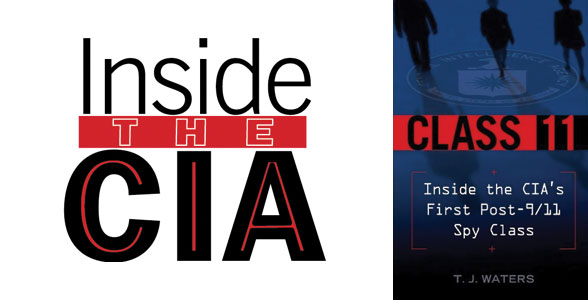In the years after the events of September 11, 2001, and in the days before Americans’ distaste for the conflict in Iraq spread across party lines, patriotism surged in the United States. As late as 2005, 81 percent of Americans believed “patriotism was ‘in,’ meaning it is an important factor in their individual identities,” according to a poll conducted by the Roper Reports unit of NOP World, a research subsidiary of United Business Media.
One of those is T. J. Waters (Chattanooga ’90), who took a proactive approach to expressing his patriotism. He was selected by the Central Intelligence Agency (CIA) to join the first post-9/11 spy class. His book about the experience, Class 11, was published recently by Dutton, a member of Penguin Group (USA) Inc. Waters remains in the intelligence community today and is a self-described “true believer” in the CIA’s mission.
UT Chattanooga graduate T.J. Waters, author of Class 11, says he’s a “true believer” in the CIA.
“One problem the CIA has and will always have is their successes must remain secret. Only the failures become front-page news. As a result, the average person has a very skewed view of what the CIA is and what it does,” Waters says. “CIA employees are normal people just like you and me. That they now have an extraordinary job is what makes them interesting from a storytelling perspective.”
Waters’s training took him into a classroom where he and his colleagues observed what looked like an ordinary dragonfly but was actually a listening device used to pick up outdoor conversation. The students were astounded to learn that this technology was used in the 1960s.
But when asked about the toys spies use today, Waters was understandably tight-lipped. “I’m afraid that what I described is the limit of my authorization to discuss. Suffice to say it’s impressive,” Waters said. “The engineers in the Directorate of Science and Technology are astounding.”
Class 11 explores the hardships of secrecy and isolation from family and friends. Waters deftly balances these social challenges with the excitement of how trainees learned “mastering disguises, how to withstand interrogations, and how to cross into enemy territory without being detected.” If this sounds like a great idea for a new television series, it could be. Based on Waters’s book, Jeffrey Nachmanoff is writing Class 11, a TV series for ABC. Saying he is unfamiliar with writing for television, Waters has helped with script development.
“I’m content to simply look over their shoulders and give a quick nod or a slight scowl depending on what they write. As to a timeframe, I really don’t know. That’s entirely up to the entertainment gods.”
Waters honed what he called “an odd mix of skill sets” at UT Chattanooga. His bachelor of arts degree in biology gave him a firm foundation in the scientific method, which he says the agency has embraced as a corrective action after the 9/11 Commission Report on failed intelligence analysis.
“I also give credit to the heavy emphasis UTC placed on writing. Good writing will take you far in a number of different professions. Good writers are hard to find, so it was nice to have a leg up on other applicants in that area,” Waters says.
Retired English professor Dr. Robert Vallier’s scientific writing course and a course in proposal and technical writing were of great value to Waters, serving him well as an intelligence professional and as a writer. “I currently teach in a new degree program for the intelligence community, and I mirror the teaching style of organic chemistry professor Dr. Tom Waddell, who was always very good at explaining complicated subjects in an engaging way,” Waters says.
When he wrote Class 11, Waters says he had to abide by a formal process followed by former CIA officers who publish memoirs, works of fiction, screenplays, and similar works. “There is a prepublication review board that examines the material and redacts anything that is classified. If there’s any uncertainty on classification they simply ask the author to provide an open source reference already in the public domain–a book, news report, or magazine article,” Waters says. “With Class 11 we went through a lot of steps to ensure that no sources or methods were revealed and the identities of the students remained masked. It was difficult to write with all the caveats they require, but I’m pleased with the results.”
And what has become of the colleagues Waters came to know in Class 11?
“People are surprised and pleased to learn Class 11 officers reported firsthand on issues splashed across the news every night; the genocide in Darfur, the tidal wave in Indonesia, and child-trafficking in Asia,” Waters says. “These are but a few of the many unexpected topics the CIA works on behalf of the American people.”



